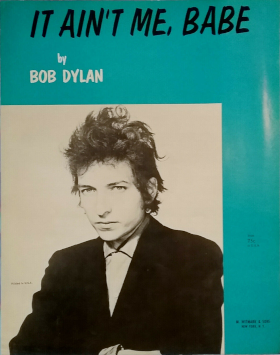
"It Ain't Me Babe" is a song by Bob Dylan that originally appeared on his fourth album Another Side of Bob Dylan, which was released in 1964 by Columbia Records. According to music critic Oliver Trager, this song, along with others on the album, marked a departure for Dylan as he began to explore the possibilities of language and deeper levels of the human experience. Within a year of its release, the song was picked up as a single by folk rock act the Turtles and country artist Johnny Cash. Jan & Dean also covered the track on their "Folk 'N Roll" LP in 1965.

Johnny Cash at San Quentin is the 31st overall album and second live album by American singer-songwriter Johnny Cash, recorded live at San Quentin State Prison on February 24, 1969, and released on June 16 of that same year. The concert was filmed by Granada Television, produced and directed by Michael Darlow. The album was the second in Cash's conceptual series of live prison albums that also included At Folsom Prison (1968), På Österåker (1973), and A Concert Behind Prison Walls (1976).
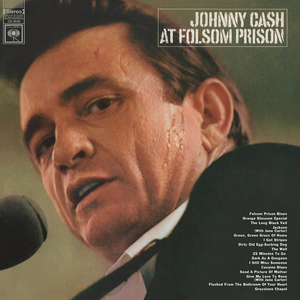
Johnny Cash at Folsom Prison is the first live album by American singer-songwriter Johnny Cash, released on Columbia Records on May 6, 1968. After his 1955 song "Folsom Prison Blues", Cash had been interested in recording a performance at a prison. His idea was put on hold until 1967, when personnel changes at Columbia Records put Bob Johnston in charge of producing Cash's material. Cash had recently controlled his drug abuse problems, and was looking to turn his career around after several years of limited commercial success. Backed by June Carter, Carl Perkins, and the Tennessee Three, Cash performed two shows at Folsom State Prison in California on January 13, 1968. The initial release of the album consists of fifteen songs from the first show and two from the second.
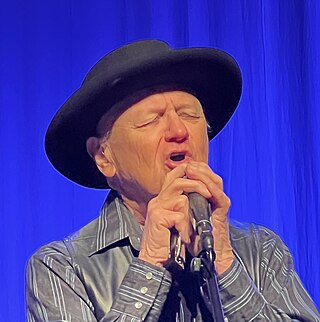
Charlie McCoy, is an American harmonica virtuoso and multi-instrumentalist in country music. He is best known for his harmonica solos on iconic recordings such as Candy Man, He Stopped Loving Her Today, I Was Country When Country Wasn't Cool"(Barbara Mandrell), and others. He was a member of the progressive country rock bands Area Code 615 and Barefoot Jerry. After recording with Bob Dylan in New York, McCoy is credited for unknowingly influencing Dylan to decide come to Nashville to record the critically acclaimed 1966 album "Blonde on Blonde".

Joan Baez/5 is the fifth solo album and third studio album by American folk singer Joan Baez, released in October 1964. It peaked at number 12 on the Billboard 200 chart. The single "There But for Fortune" reached number 50 on the Billboard Hot 100 in the U.S. and became a top-ten single in the UK.

"All I Really Want to Do" is a song written by Bob Dylan and featured on his Tom Wilson-produced 1964 album, Another Side of Bob Dylan. It is arguably one of the most popular songs that Dylan wrote in the period immediately after he abandoned topical songwriting. Within a year of its release on Another Side of Bob Dylan, it had also become one of Dylan's most familiar songs to pop and rock audiences, due to hit cover versions by Cher and the Byrds.

"Ring of Fire" is a song made popular by Johnny Cash when it appeared on his 1963 album Ring of Fire: The Best of Johnny Cash. Written by Cash's eventual second wife, June Carter Cash, and Merle Kilgore, it was originally recorded as "(Love's) Ring of Fire" by June's sister, Anita Carter, on her 1963 album Folk Songs Old and New.

Unearthed is a box set by American country singer Johnny Cash. It was released by American Recordings on November 25, 2003, two months after Cash's death. The album was compiled by Cash and Rick Rubin, who also produced the set. It was certified Gold on December 2, 2004, by the Recording Industry Association of America.
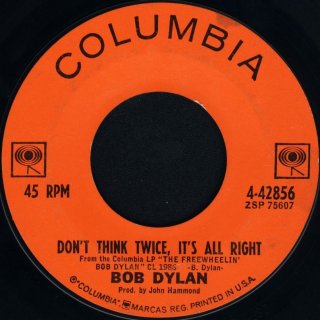
"Don't Think Twice, It's All Right" is a song written by Bob Dylan in 1962 and released the following year on his second album, The Freewheelin' Bob Dylan, and as the b-side of the single "Blowin' in the Wind". The song was covered by several other artists, including Peter, Paul and Mary, who released it as a single, which reached the Top 10 of the Billboard Hot 100.

Johnny Cash Sings the Ballads of the True West is a concept double album and the 22nd overall album released by country singer Johnny Cash, released on Columbia Records in 1965. Covering twenty individual songs, the album, as its title suggests, contains various ballads and other songs on topics related to the history of the American Old West. This includes Carl Perkins' "The Ballad of Boot Hill", "Streets of Laredo", and the sole single from the album, "Mr. Garfield", describing the shock of the population after the assassination of President James Garfield. One of the songs, "25 Minutes to Go", would later be performed at Folsom Prison and appear on Cash's famous At Folsom Prison recording in 1968, while the melody of "Streets of Laredo" would be recycled for the song "The Walls of a Prison" featured on Cash's album From Sea to Shining Sea.

Rockabilly Blues is an album by American country singer Johnny Cash, released on Columbia Records in 1980. Highlights include "Cold Lonesome Morning," which had some minor chart success, "Without Love," by his son-in-law, Nick Lowe, and a cover of the witty "The Twentieth Century Is Almost Over." The first two of the aforementioned songs were the only singles from the album, though "Without Love" hardly enjoyed any chart success, peaking at No. 78. "The Twentieth Century is Almost Over" was re-recorded five years later by Cash and Waylon Jennings, Willie Nelson and Kris Kristofferson, collectively known as The Highwaymen, on their first album entitled Highwayman, though it was, in essence, a duet with Nelson.
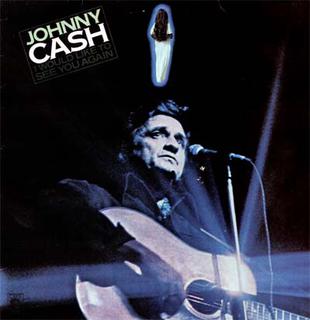
I Would Like to See You Again is the 57th album by American country singer Johnny Cash, released on Columbia Records in 1978. The title track peaked at #12 on the singles chart, while "There Ain't No Good Chain Gang" reached #2; the album itself peaked at #23. The album features a pair of duets with Waylon Jennings, one of which was the "There Ain't No Good Chain Gang" single; it was one of Cash's first collaborations with Jennings, and the two recorded songs together throughout the 1980s, including a separate album entitled Heroes. Cash and Jennings would also work together as The Highwaymen with Willie Nelson and Kris Kristofferson.

Johnny Cash på Österåker is a live album by country singer Johnny Cash released on Columbia Records in 1973, making it his 43rd overall release. The album features Cash's concert at the Österåker Prison in Sweden held on October 3, 1972. Its counterparts in concept are the more notable At Folsom Prison (1968), At San Quentin (1969), and A Concert Behind Prison Walls (1976). Unlike aforementioned, På Österåker does not contain any of Cash's most well-known songs; it does, however, include a version of Kris Kristofferson's "Me and Bobby McGee". "Orleans Parish Prison" was released as a single, faring rather poorly on the charts. Cash had previously recorded "I Saw a Man" for his 1959 album, Hymns by Johnny Cash.
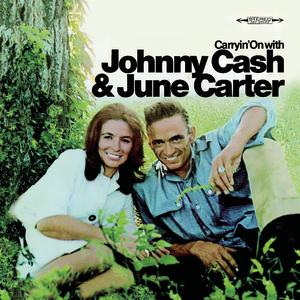
Carryin' On with Johnny Cash & June Carter is an album by Johnny Cash and June Carter released in 1967, on Columbia Records. The album consists exclusively of duets by Cash and Carter, including "Jackson"; "Long-Legged Guitar Pickin' Man" was also released as a single. One track, a cover of Bob Dylan's "It Ain't Me, Babe", dated back to 1964 and had previously been released on Cash's 1965 album, Orange Blossom Special.
"You Ain't Goin' Nowhere" is a song written by American musician Bob Dylan in 1967 in Woodstock, New York, during the self-imposed exile from public appearances that followed his July 29, 1966 motorcycle accident. A recording of Dylan performing the song in September 1971 was released on the Bob Dylan's Greatest Hits Vol. II album in November of that year, marking the first official release of the song by its author. Earlier 1967 recordings of the song, performed by Dylan and the Band, were issued on the 1975 album The Basement Tapes and the 2014 album The Bootleg Series Vol. 11: The Basement Tapes Complete.
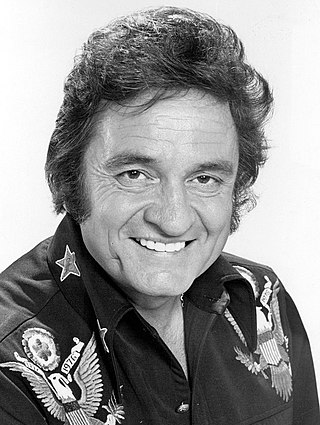
John R. Cash was an American country singer-songwriter. Most of Cash's music contains themes of sorrow, moral tribulation, and redemption, especially songs from the later stages of his career. He was known for his deep, calm bass-baritone voice, the distinctive sound of his Tennessee Three backing band characterized by train-like chugging guitar rhythms, a rebelliousness coupled with an increasingly somber and humble demeanor, free prison concerts, and a trademark all-black stage wardrobe, which earned him the nickname the "Man in Black".
"Orange Blossom Special" is a fiddle tune about the luxury passenger train of the same name. The song was written by Ervin T. Rouse (1917–1981) in 1938 and was first recorded by Rouse and his brother Gordon in 1939. Often called simply "The Special" or "OBS", the song is commonly referred to as "the fiddle player's national anthem".

"Daddy Sang Bass" is a song written by Carl Perkins, with lines from the chorus of "Will the Circle Be Unbroken?", and recorded by American country music singer Johnny Cash. It was released in November 1968 as the first single from the album The Holy Land. The song was Cash's sixty-first release on the country chart, going on to No. 1 on the Billboard country chart for 6 weeks and spending a total of 19 weeks there. The single reached No. 56 on the Cashbox pop singles chart in 1969. "Daddy Sang Bass" was also released on the Columbia Records Hall of Fame Series as a 45, #13-33153, b/w "Folsom Prison Blues". The record was nominated in the CMA awards category of Single of the Year by the Country Music Association (CMA) in 1969.
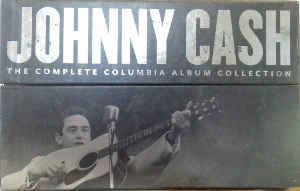
The Complete Columbia Album Collection is a box set by country singer Johnny Cash, released posthumously in 2012 on Columbia Records and Legacy Recordings.
"Without Love" is a song by Nick Lowe from his 1979 studio album Labour of Lust.



















